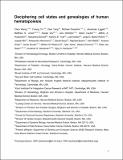Deciphering cell states and genealogies of human hematopoiesis
Author(s)
Weng, Chen; Yu, Fulong; Yang, Dian; Poeschla, Michael; Liggett, L. Alexander; Jones, Matthew G.; Qiu, Xiaojie; Wahlster, Lara; Caulier, Alexis; Hussmann, Jeffrey A.; Schnell, Alexandra; Yost, Kathryn E.; Koblan, Luke; Martin-Rufino, Jorge D.; Min, Joseph; Hammond, Alessandro; Ssozi, Daniel; Bueno, Raphael; Mallidi, Hari; Kreso, Antonia; Escabi, Javier; Rideout, William M.; Jacks, Tyler; Hormoz, Sahand; van Galen, Peter; Weissman, Jonathan S.; Sankaran, Vijay G.; ... Show more Show less
DownloadHSC_Lineage tracing MS.pdf (311.0Kb)
Open Access Policy
Open Access Policy
Creative Commons Attribution-Noncommercial-Share Alike
Terms of use
Metadata
Show full item recordAbstract
The human blood system is maintained through the differentiation and massive amplification of a limited number of long-lived hematopoietic stem cells (HSCs)1. Perturbations to this process underlie diverse diseases, but the clonal contributions to human hematopoiesis and how this changes with age remain incompletely understood. While recent insights have emerged from barcoding studies in model systems4,5,16,17, simultaneous detection of cell states and phylogenies from natural barcodes in humans has been challenging. Here, we introduce an improved single-cell lineage tracing system based on deep detection of naturally-occurring mitochondrial DNA (mtDNA) mutations with simultaneous readout of transcriptional states and chromatin accessibility. We use this system to define the clonal architecture of HSCs and map the physiological state and output of clones. We uncover functional heterogeneity in HSC clones, which is stable over months and manifests as differences in total HSC output as well as biases toward the production of different mature cell types. We also find that the diversity of HSC clones decreases dramatically with age leading to an oligoclonal structure with multiple distinct clonal expansions. Our study thus provides the first clonally-resolved and cell-state aware atlas of human hematopoiesis at single-cell resolution revealing an unappreciated functional diversity of human HSC clones and more broadly paves the way for refined studies of clonal dynamics across a range of tissues in human health and disease.
Date issued
2024-01-22Department
Massachusetts Institute of Technology. Department of Biology; Howard Hughes Medical Institute; Koch Institute for Integrative Cancer Research at MITPublisher
Springer Science and Business Media LLC
Citation
Weng, C., Yu, F., Yang, D. et al. Deciphering cell states and genealogies of human hematopoiesis. Nature (2024).
Version: Author's final manuscript
ISSN
0028-0836
1476-4687
Keywords
Multidisciplinary
Collections
The following license files are associated with this item: